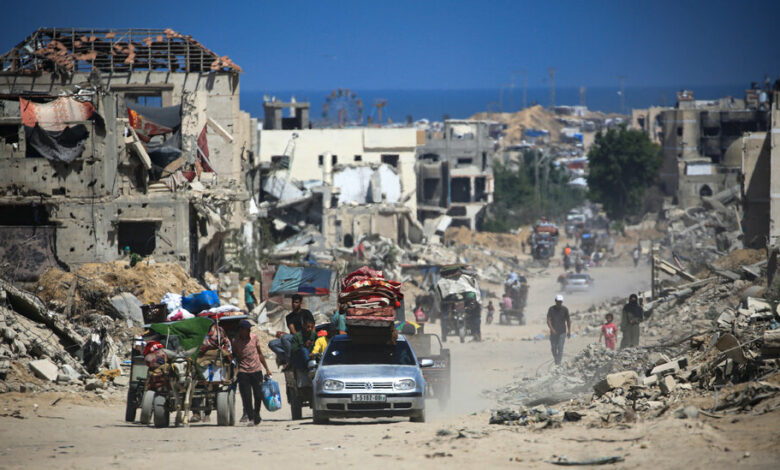Repeated evacuation orders take their toll on Gaza’s already weakened residents

The Israeli army this week ordered the evacuation of about a third of the Gaza Strip, a population that is increasingly ill-equipped to cope with the repeated forced displacements. After nearly nine months of war, tens of thousands have been killed and wounded, and famine threatens the area.
The measure, which the United Nations estimates will affect about 250,000 people, was the largest since October, when about a million residents of northern Gaza were told to flee their homes, the organization said. said on Tuesday.
“It’s an endless cycle of death and displacement,” Louise Wateridge, a spokeswoman for the main U.N. agency helping Palestinians, UNRWA, said in voice messages from central Gaza on Wednesday. “People here are saying they are losing hope, losing willpower, facing another forced displacement and absolutely no assurance of safety.”
On Monday, the Israeli military issued warnings to evacuate large parts of the cities of Khan Younis and Rafah, and by Tuesday thousands of people had already begun to flee. The order was followed by a night of heavy bombardment in areas of southern and central Gaza. The order came after the Israeli military said Palestinian armed groups had fired a barrage of about 20 rockets from Gaza toward Israeli cities on Monday.
UN Secretary-General spokesman Stéphane Dujarric said Tuesday his colleagues were “very concerned” about the impact of the measure.
“People are faced with the impossible choice of having to move – some probably for the second or even third time – to areas where there is little space or services, or to stay in areas where they know there will be heavy fighting,” he said.
The measure affects more than 90 school buildings, many of which have been turned into overcrowded shelters as people run out of places to sleep, and four health facilities, Mr Dujarric said.
One of them is the European Hospital in Khan Younis, where many found shelter and hundreds of patients were treated. After medical staff, patients and displaced people fled the hospital, the Israeli army said on Tuesday that there was no need for people to leave the hospital.
The International Committee of the Red Cross reported on Wednesday that the hospital was no longer functioning because so many staff had left.
Although many people in the evacuation zone have decided to flee again, moving is becoming increasingly difficult as the war continues.
“In terms of people’s ability to move, it’s been eight months of war, people are extremely tired, they’re exhausted, they’re malnourished,” Ms Wateridge said. In terms of health, she said, “people are much weaker, there are more injuries, there’s less medicine available, less fresh fruit, less water.”




